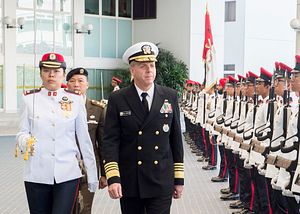Last week, Philip Davidson, the commander of the U.S. Indo-Pacific Command, embarked on his first visit to Vietnam in his current capacity. Though the headlines focused on the development itself, its significance should be understood in the broader context of U.S.-Vietnam defense ties, which have continued to deepen during the Trump administration despite lingering concerns.
As I have observed before in these pages, over the decades, U.S.-Vietnam defense cooperation has slowly grown to encompass areas including maritime security, humanitarian assistance and disaster relief, and peacekeeping. This realm of the relationship has deepened further across the board under the Trump administration, even amid some lingering concerns about wider aspects of the administration’s Asia policy and some challenges Vietnam has been facing in terms of its own domestic and foreign policy.
That has continued on into 2019 as well. Despite some lingering challenges and limitations in the defense relationship, there have been developments to reinforce this aspect of ties, with one recent example on the capacity-building side being the delivery of another six Metal Shark patrol vessels to the Vietnamese Coast Guard publicly announced earlier this month. Both sides are also considering initiatives to boost defense ties still further, including another U.S. aircraft carrier visit to Vietnam and high-level visits by Vietnamese officials to the United States.
Last week, the defense relationship was in the headlines again with the visit of Commander of the U.S. Indo-Pacific Command (USINDOPACOM) Admiral Philip Davidson. Davidson was on his first working visit to Vietnam in his current capacity, and the trip came amid other developments in wider U.S.-Vietnam relations as well, including the visit of a U.S. congressional delegation that saw further inroads made such as the inking of a new agreement on disabilities assistance and the official launch of a new U.S.-funded project on dioxin contamination remediation at Bien Hoa airport.
Davidson’s visit involved a series of interactions. In terms of meetings, he met with several Vietnamese officials in Hanoi including Defense Minister Ngo Xuan Lich and Deputy Defense Minister and Chief of the General Staff of the Vietnam People’s Army Phan Van Giang.
Per Vietnamese official accounts. Davidson’s meeting with Giang focused on a range of issues. Both sides took stock of developments in the U.S.-Vietnam comprehensive partnership and talked about issues of common interest, including North Korea with Vietnam having just hosted the second Trump-Kim summit earlier this year. They also agreed to look at opportunities to expand bilateral defense collaboration in various areas, including delegation exchanges, personnel training, war legacy issues, and the sharing of experiences with respect to participation in UN peacekeeping operations.
Apart from this, Davidson also paid a visit to Ho Chi Minh City as well. There, he met with officials including the Secretary of the Ho Chi Minh City municipal Party Committee Nguyen Thien Nhan. The discussions focused on a range of bilateral, regional, and global issues, with Nhan expressing appreciation for U.S. assistance in areas such as managing dioxin contamination and indicating that Ho Chi Minh city hoped to continue to help foster cooperation activities between the United States and Vietnam. Davidson also made a stop to visit Military Hospital 175 of the defense ministry in Ho Chi Minh city, which highlighted Vietnam’s ongoing efforts at fostering military medicine collaboration as well as its recent deployment of the first level-two field hospital and officers to the United Nations Mission in South Sudan.
Of course, Davidson’s trip to Vietnam, significant though it is, is only one of several defense-related interactions between the two countries, which in turn is only one aspect of their comprehensive partnership. Nonetheless, as Washington and Hanoi continue to look for opportunities to collaborate in their bilateral relationship and in the wider Indo-Pacific region more generally, such interactions will be important to watch to assess the balance of opportunities and challenges inherent as they seek to pursue these lines of effort.

































